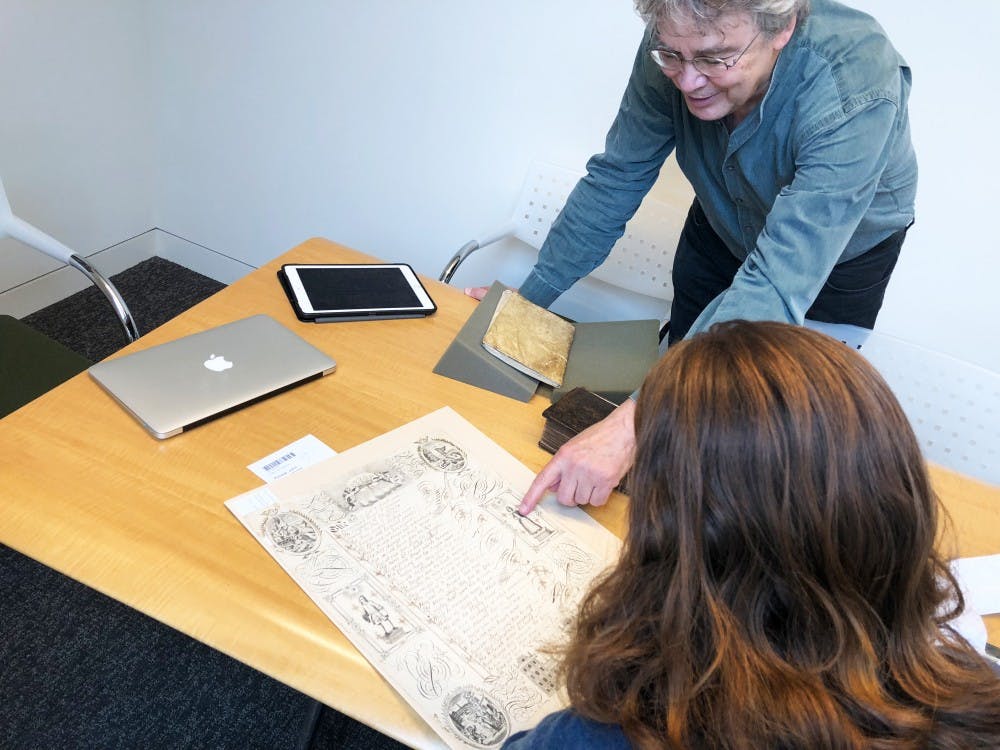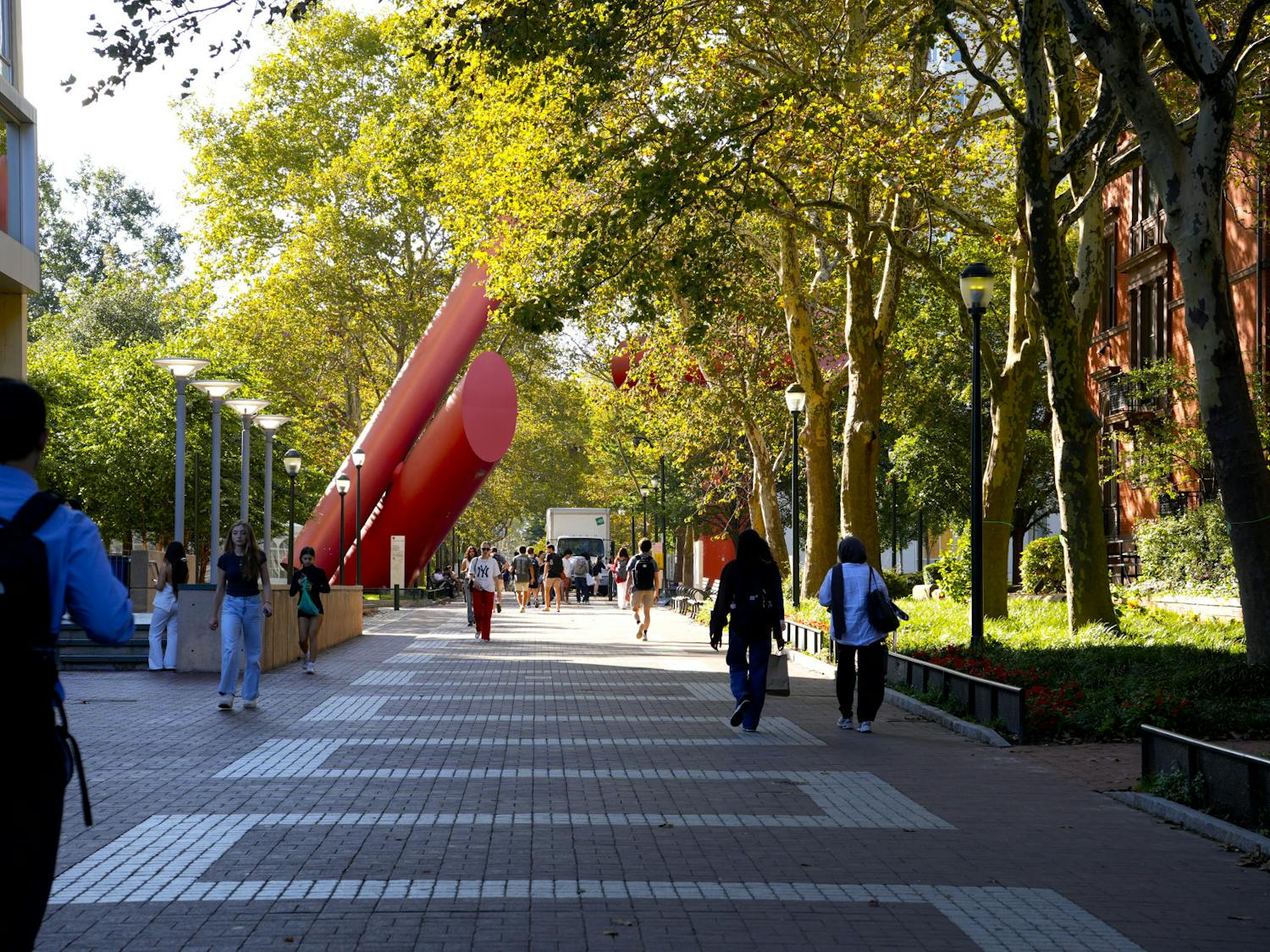Personal letters from the hands of George Washington and Benjamin Franklin. Pages from Isaac Newton’s notebook. A copy of the King James Bible from 1613. Manuscripts of Byron’s poetry — complete with a bit of his hair.
For a certain group of dedicated undergraduate students at The University of Pennsylvania, documents like these are readily accessible during their club meetings on the top floor of Van Pelt Library.
The Penn Manuscript Collective is a group of undergraduate students who, along with several faculty assistants, have taken on the project of transcribing a rich assortment of the various manuscripts the University owns, deciphering and typing up the content of old texts to share online. This work is based out of the Kislak Center for Special Collections, Rare Books and Manuscripts.
English professor Jean-Christophe Cloutier said transcription of little-known documents is essential for academic work.
"It ensures a transfer of knowledge and disseminates it to the public, taking it out of the shadows," he said.
While Penn has possessed a myriad of firsthand sources of knowledge throughout its history, there has been a revitalized effort to share these with the community, as with the library’s renovations and the digitization of some major cultural documents.
Especially in the past year, the students of the Penn Manuscript Collective have expedited this effort, establishing several online initiatives for the public eye.
Along with a student-run blog and online journals, the Collective posts publications based on its findings, which, in some cases, can be the first of their kind. The group has also recently integrated its collection into the Van Pelt database, making members’ findings all the more accessible to those interested in similar research. The Collective would like to try posting to open forums where visitors can share transcripts of their own in the near future, too.
RELATED LINKS:
https://www.thedp.com/article/2018/01/penn-libraries-grants-digitization-muslim-manuscripts-columbia-university-philadelphia-collection
https://www.thedp.com/article/2011/04/alum_donates_manuscripts_worth_20m_to_penn
“As someone who has gravitated more towards biology, this is a way for me to explore other interests,” said College sophomore Kelly Liang, one of the Collective’s vice presidents. “And the most important thing is that we always have fun doing it.”
Members have been focusing particularly on 16th- and 17th-century recipes among other resources in recent weeks, but they are always looking for more to dig into.

Other current projects include letters and original drafts written by Walt Whitman in preparation for events celebrating the bicentennial of his birth in 2019.
Biweekly meetings in a seminar-like style allow the students to update their online findings and to collaborate in various workshops, which focus on anything from analyzing the music of several world-famous composers to talking strategy on how to decipher Old English writing. The Collective has also taken trips around Philadelphia to places like The Library Company, another site renowned for its collection of primary documents. Members are also encouraged to take on larger endeavors of their own, fostering original, independent research.
The Collective was formed in 2015 by 2016 College graduate John Baranik and 2017 College graduate Nicole Flibbert with guidance from recently retired Penn professor Peter Stallybrass and the Kislak Center staff. In fact, this past Monday, Oct. 15, marks the anniversary of their first official meeting.
Flibbert noted that, while the Collective has come a long way since then, the same “excitement” drives it at its core.
“[The members] are so enthusiastic about learning … and we’ve really gained a lot from each other,” said Flibbert.
Stallybrass noted in the Collective's journal that while it is enjoyable to work with the library's rare manuscripts, the discoveries the Collective makes become central to coursework as well.
For example, Flibbert's senior thesis on the anonymous play entitled "The Royal Merchant" — which she transcribed and analyzed for months on end — is now being cited by scholars.
The Collective focuses primarily on English works, but any student of any background is welcome to reach out and get involved.
“[Penn] is the only place I know of where anyone can get involved with manuscripts like these," Stallybrass added. "Whatever your interests are, let’s look into them."
In addition to fueling students’ passions for the written word, the group’s transcription work has made potentially valuable information far more accessible to readers.
“This group is a superb example of the new kinds of crowdsourcing that the digital age is making possible,” echoed Cloutier, who is committed to transcribing manuscripts. “It’s an admirable task, and everyone involved should feel proud — happy in their knowledge that they are contributing to a grand project of democratizing knowledge.”
RELATED LINKS:
https://www.thedp.com/article/2018/01/penn-libraries-grants-digitization-muslim-manuscripts-columbia-university-philadelphia-collection
https://www.thedp.com/article/2011/04/alum_donates_manuscripts_worth_20m_to_penn









